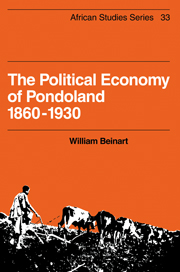Book contents
- Frontmatter
- Contents
- List of maps
- Preface
- Abbreviations
- Introduction
- 1 The political economy of Pondoland in the nineteenth century
- 2 Crops, cattle and the origins of labour migrancy, 1894–1911
- 3 Rural production and the South African state, 1911–1930
- 4 Chiefs and headmen in Pondoland, 1905–1930
- 5 Rural differentiation, alliance and conflict, 1910–1930
- Postscript
- Tables
- Notes
- Select bibliography
- Index
- BOOKS IN THIS SERIES
2 - Crops, cattle and the origins of labour migrancy, 1894–1911
Published online by Cambridge University Press: 26 February 2010
- Frontmatter
- Contents
- List of maps
- Preface
- Abbreviations
- Introduction
- 1 The political economy of Pondoland in the nineteenth century
- 2 Crops, cattle and the origins of labour migrancy, 1894–1911
- 3 Rural production and the South African state, 1911–1930
- 4 Chiefs and headmen in Pondoland, 1905–1930
- 5 Rural differentiation, alliance and conflict, 1910–1930
- Postscript
- Tables
- Notes
- Select bibliography
- Index
- BOOKS IN THIS SERIES
Summary
Production, exchange and the entrenchment of economic dependence
At the time Pondoland was annexed, Cape ‘native policy’ was in flux. The opening of the Witwatersrand goldfields in the mid-1880s and further development of a capitalist mining sector in the subcontinent had, as Bundy and Trapido have suggested, important repercussions for the African peasantry of the Cape. Demand for labour in the mines increased rapidly. Large new markets in the interior quickened the pulse of commerce in the Colonial ports and pulled the Cape out of the economic depression of the early 1880s. Labour was also required in the coastal towns and farms of the Colony. The influence of those Colonial interests which favoured the retention of an African peasantry began to wane; that of those who saw the future of the African population as labourers in capitalist enterprises waxed.
Rhodes brought the issues facing the administration in the Territories into sharp focus in a speech delivered at Kokstad, shortly after he had visited Pondoland to finalise the terms of annexation.
We have now on this side of the Kei 600,000 Natives, and we must leave the land for them. The Natives [will] no longer be destroyed by tribal wars and their increase [will] become a very serious matter. We can only hope that we shall be able to deal with them and show them that there is dignity in labour and that we pay the highest price for labour of any country in which the manual work is performed by natives.
- Type
- Chapter
- Information
- The Political Economy of Pondoland 1860–1930 , pp. 42 - 69Publisher: Cambridge University PressPrint publication year: 1982
- 1
- Cited by



